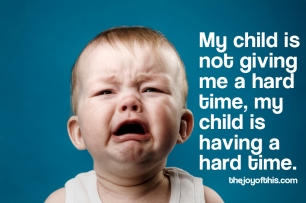Jack is 19 months old now, and he is starting to have his own opinions about things more and more. Yesterday he had his second ever big tantrum, and I thought I would share how we deal with it in a positive parenting way. I got most of my ideas from The book Peaceful Parent and her web page ahaparenting.com that has a free email list you can sign up for which is great. I also joined a few facebook groups about gentle parenting which are nice to read other people’s suggestions.
So yesterday at night Jack was overtired which was my fault- I should have tried to get him to bed earlier. He wanted to play though and get really upset when I told him he couldn’t play with the water in his learning tower because it was bedtime. What I try to remember with discipline is LOVE and LIMITS. So I set limits and am firm with them (he did not get to play with the water) but I am empathic and supportive and loving. This looked like my husband coming over and us carrying Jack into the bedroom. I asked Jack if he wanted a hug but he pushed me away and was screaming. So I sat next to him and said that I would be there for him and love him. My husband tried to get closer too but Jack was too upset, so he also said that he was there if he needed him in a calm voice. I verbalized Jack’s feelings saying “it looks like you’re really sad and frustrated.” “I bet you wish you could play with the water, and we can play with it tomorrow.” He screamed and cried for almost 30 minutes I think, and I would intermittently say things like “it’s ok to be sad,” or suggest something like “do you want to pet your fabric animals to see if that makes you feel better?”
For a long time he didn’t want to do anything or have anyone touch him and just cried, and my husband and I stayed nearby and calmly said something every few minutes. When Jack finally started to calm down we offered some ideas and he said he wanted a snack and water, so we brought it over. He independently came over to hug me while my husband got the snack which made me feel really good. It really reinforces that dealing with his big feelings in a supportive way lets him know that we love him no matter what. I’m so glad I read about positive parenting instead of thinking that punishment or ignoring is the best way to deal with tantrums. I can’t imagine how hard it would be for a toddler to get left alone or punished for there scary feelings he has which already feel overwhelming and make him feel out of control. Going through this with my husband also made me fall in love with him even more- seeing how patient and gentle he could be with our son who was having such a hard time.



